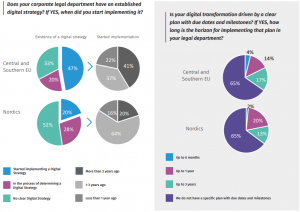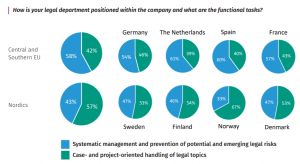Earlier this year, Wolters Kluwer conducted a survey together with the European Company Lawyer Association (ECLA) on the digital maturity level of legal departments across Europe. Based on this survey, Wolters Kluwer has now conducted a similar study in the Nordics. The aim of this second study was to benchmark the status of legal departments in the Nordics compared to their counterparts in central and southern Europe as regards digital strategy, the processes they want to improve and how they cope with challenges related to the implementation of legal technology.
As was shown by the original study, the best performing legal departments operate as a true business partner to other departments, understand the meaning of strategy, digitalization and act as efficient as possible, putting the business of the company first.

A very interesting finding in this Nordic edition, is that legal departments in the Nordics consider themselves more successful in implementing legal technology than the rest of Europe. They also agree more strongly that having a clear digital strategy enables them to increase the value that can be delivered in the most efficient way.
But in fact, as shown by the report, the legal departments in the Nordics lag behind in terms of creating and implementing such a strategy.

Surprisingly, a clear majority (65%) of the Nordic legal departments do not have a clear digital strategy with due dates and milestones.
Furthermore, as many as 79% (and 82% for smaller companies) of the legal departments indicate that there is no specific budget for a digital strategy.
They are also acting more like an external law firm to the company, with case- and project-orientated handling of legal topics.
 When looking at the functional tasks of legal departments, the central and southern companies follow a systematic prevention approach as an integrated part of the company, whereas the Nordics there is the opposite, a slightly majority handles legal topics on a case-by-case basis.
When looking at the functional tasks of legal departments, the central and southern companies follow a systematic prevention approach as an integrated part of the company, whereas the Nordics there is the opposite, a slightly majority handles legal topics on a case-by-case basis.
This approach makes it harder to own the tools and processes for the management of the legal risks within the company and to work systematically to prevent potential and emerging risks. As the responsible business manager for the Nordic survey at Wolters Kluwer, Floortje de Rooij, pointed out in her summary of the report:
“It is of the outmost importance to use the right tools and processes for the management of the department. If you are continuously occupied by cases or projects on the fly, it becomes difficult to think about the best strategy and what you would like to achieve on the long run.”
When it comes to implementing legal technology, legal departments across Europe very much agree upon the benefits, but nevertheless they have experienced challenges and felt not very successful. (Also here however, the Nordics consider themselves more successful than their counterparts in central and southern Europe.) According to the survey though, most GCs to dot make use of any specific legal tech yet, but are in the very beginning of their digital journey. Of the solutions that the legal departments have already implemented the most common are shared documents and data repository solutions, whereas document automation is implemented the least frequently.
“I guess it is not urgent enough until it suddenly is and you can’t extinguish the fires anymore,” as Floortje de Rooij put it in her summary of the study.
Read the full report here: Digital Maturity Benchmark 2020 – Nordic Legal Departments


